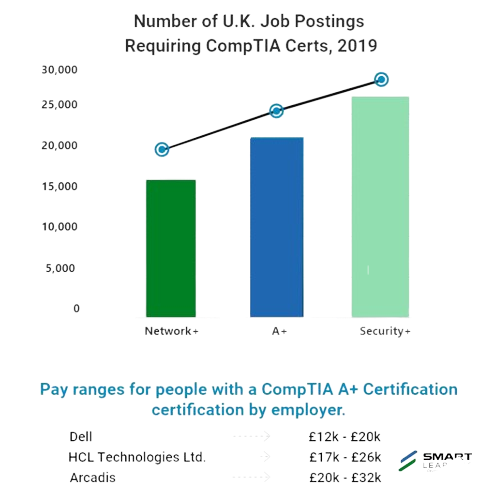CompTIA Certification Courses
Established in 1982, CompTIA serves as a leading voice and advocate for the global IT industry.
Smartlearning provides a wide range of CompTIA resources, educational programs, and certifications to IT professionals, students, and businesses worldwide.

10 years of training cybersecurity professionals globally.
For over a decade we have trained, certified, and helped hundreds of professionals establish their selves via our tested proven personalized training models producing 90% success rate YOY.
We are known globally for our excellence in training delivery and helping our students achieve success in their chosen career paths.
If you meet 10 Smartlearning alumni, 9 out of 10 passed their CompTIA and other cybersecurity certification exams in one sitting.
We don’t just train and certify, we mentor and provide support for our students via our alumni circle which houses over 700+ successful students.
Why should I take CompTIA certification?
Industry Recognition
Higher Earning Potential
Job Security
CompTIA certification is a worthwhile investment in your career, providing you with the skills, credentials, and opportunities needed to succeed in the dynamic field of information technology.
CompTIA Certification Overview
CompTIA (Computing Technology Industry Association) offers a range of vendor-neutral certifications in information technology (IT) fields such as cybersecurity, networking, cloud computing, and more.
Some of the popular certifications include:
- CompTIA A+: Entry-level certification covering IT fundamentals, including hardware, software, networking, and security.
- CompTIA Network+: Focuses on networking concepts, infrastructure, operations, and security.
- CompTIA Security+: Covers foundational cybersecurity skills, including threats, vulnerabilities, cryptography, and access control.
- CompTIA Linux+: Focuses on Linux operating system administration and management.
- CompTIA Cloud+: Covers cloud computing concepts, virtualization, and infrastructure.
- CompTIA IT Fundamentals (ITF+): Entry-level certification for individuals considering a career in IT, covering basic IT literacy and terminology.
These certifications are recognized globally and are often sought after by individuals looking to start or advance their careers in IT. Each certification typically requires passing one or more exams, and CompTIA offers study materials and resources to help candidates prepare.
The CompTIA
Career Pathway
CompTIA Jobs and Career
CompTIA certifications can open doors to various exciting job opportunities and propel your IT career forward.









IT Consultant
Leverage your expertise across diverse IT domains with a combination of CompTIA certifications, offering consulting services to businesses seeking technology solutions and strategies.
“These are just a handful of the numerous career avenues accessible to individuals holding CompTIA certifications. Armed with a solid grasp of IT skills and expertise, combined with CompTIA certifications, you have limitless opportunities for advancing your career and achieving success.”
Why Choose Us
Do you want the best or others?
Who would you rather train you if not the best? For over a decade we have trained, certified, and helped hundreds of professionals establish their selves via our tested proven personalized training models producing 90% success rate YOY.